Key takeaways:
- Ethical dilemmas require navigating conflicting values and reflecting on one’s moral compass, emphasizing the importance of empathy and insight.
- Maintaining high ethical standards in ministry establishes trust and fosters open dialogue, which is crucial for supporting vulnerable individuals.
- A collaborative approach in decision-making, involving multiple perspectives, enhances ethical understanding and promotes better outcomes.
- Transparency, adaptability, and resilience are essential lessons learned from facing ethical challenges, reinforcing personal and professional growth.
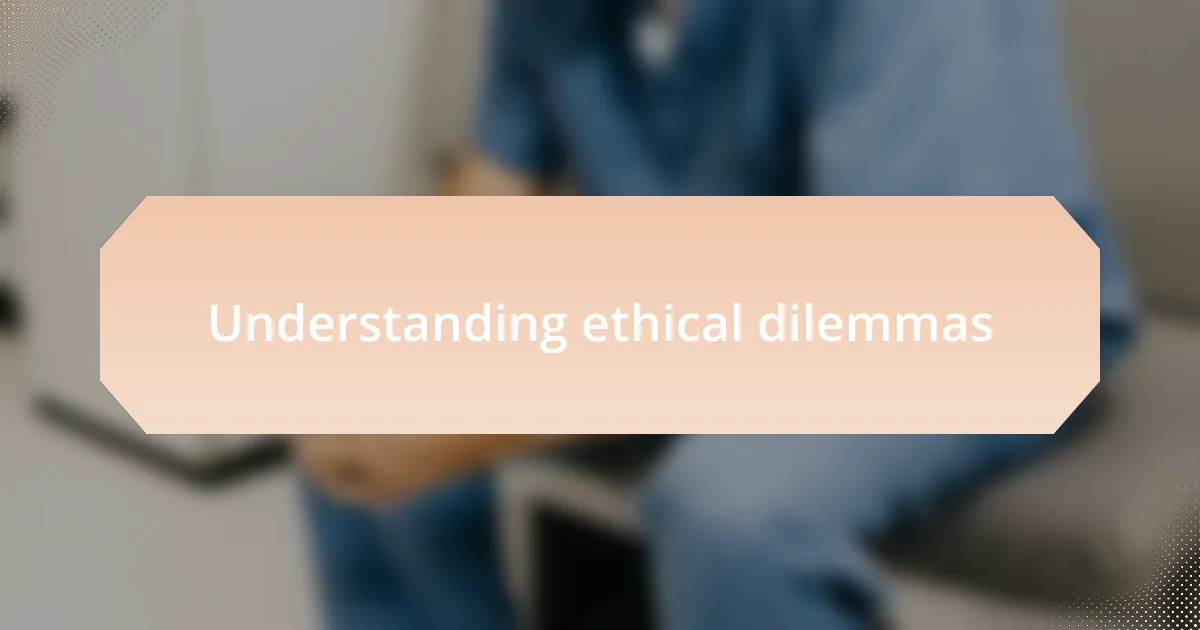
Understanding ethical dilemmas
Ethical dilemmas often arise when values clash, leaving us in a tough spot where right and wrong are not clearly defined. I remember a time in my hospital ministry when I had to decide whether to respect a patient’s wish for confidentiality or to share critical information with their family. It was emotionally charged, and I found myself grappling with the weight of responsibility—who truly deserves to know the truth?
Navigating these dilemmas can feel like walking a tightrope, where every choice comes with its own set of consequences. The questions I often ask myself include: How does this decision align with my moral compass? Am I acting in the best interest of those involved? Reflecting on these queries can bring clarity, even when the answers aren’t immediately apparent.
I’ve learned that understanding ethical dilemmas requires us to embrace our vulnerability. It’s a journey through complex emotions and gray areas, where we sometimes have to make decisions that will not please everyone. How do we find peace with those decisions? I’ve found that leaning on my values can guide me, but it’s a constant balancing act that demands empathy and insight.
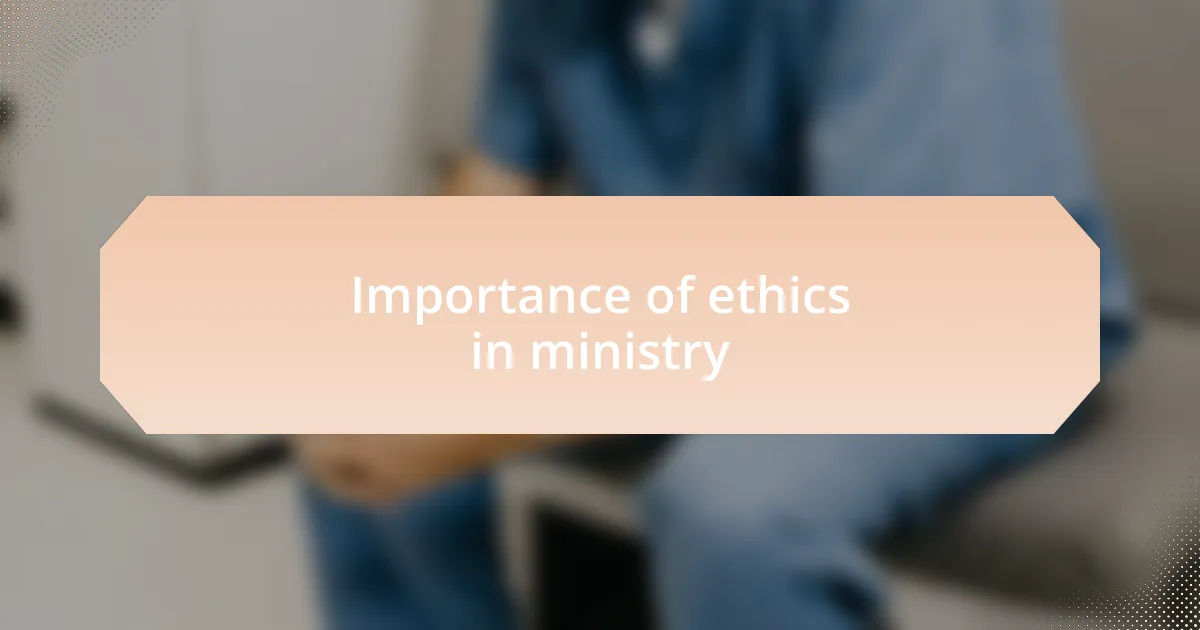
Importance of ethics in ministry
Maintaining high ethical standards in ministry is crucial because it establishes trust, which is the foundation of any relationship. I recall a moment early in my ministry when a family was relying on me to guide them through a life-or-death decision. They looked to me for honest answers, and it struck me how vital it was to approach that situation with transparency and integrity. When we prioritize ethics, we invite open dialogue, fostering a supportive environment for everyone involved.
In my experience, the weight of ethical choices can sometimes feel overwhelming, yet they offer us opportunities for growth. I often find myself reflecting on a specific case where a patient’s advanced directives conflicted with their family’s wishes. This experience taught me that ethical decisions can lead to personal revelation. How can we encourage families to communicate their values and desires clearly? This conversation is essential, as it empowers all parties and reinforces the ministry’s role as a compassionate mediator.
Ultimately, the importance of ethics in ministry extends beyond compliance—it shapes our identity as caregivers who genuinely care for our communities. Each choice we make reflects our commitment to support those in vulnerable positions. I’ve seen firsthand how ethical clarity can transform despair into hope in critical situations. When we hold ourselves to ethical principles, we not only make better decisions but also become beacons of guidance for those we serve.
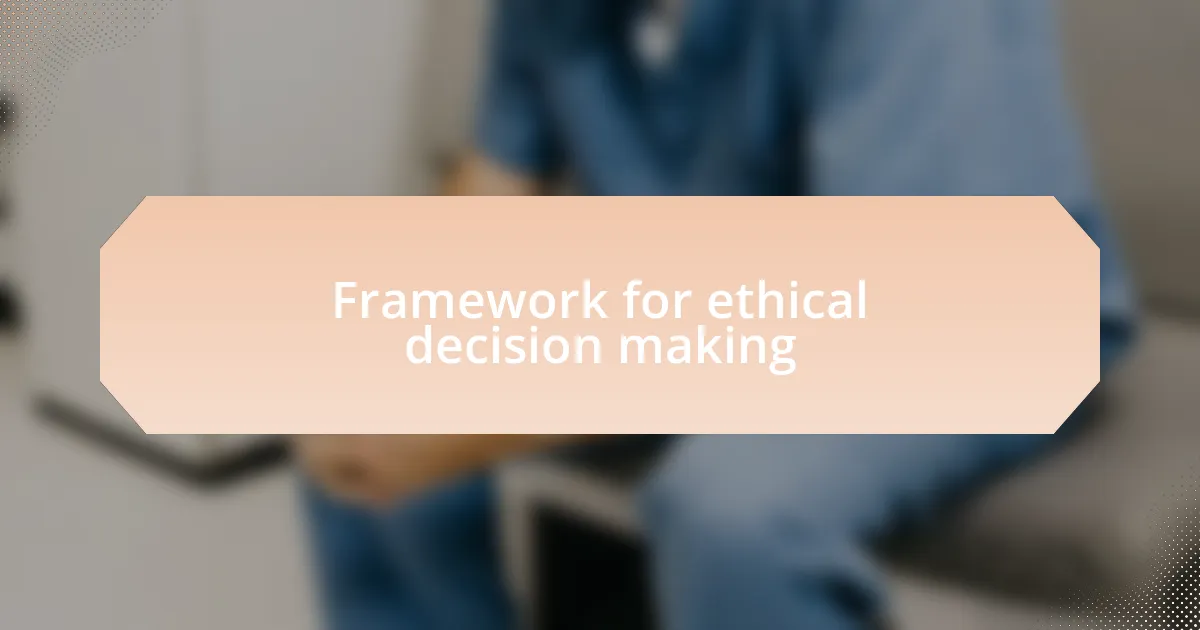
Framework for ethical decision making
A solid framework for ethical decision-making in ministry involves several key steps. First, I evaluate the situation by gathering all relevant information and considering the perspectives of those affected. I remember facing a scenario where a patient’s cultural beliefs clashed with medical advice. Understanding their background helped me approach the dialogue with empathy, demonstrating that respect for their values was just as important as the clinical facts.
Next, I assess the options available, weighing the potential outcomes against ethical principles such as beneficence and autonomy. In one instance, I found myself torn between advocating for aggressive treatment and honoring a patient’s wish for comfort care. Questions bubbled up—What would I want for my loved one? By reflecting on my values, I could articulate a respectful plan that aligned with the family’s wishes while still addressing medical concerns.
Finally, I involve others in the decision-making process, seeking counsel from colleagues or ethical committees when necessary. I’ve often found that collaboration not only enriches the decision but also alleviates the burden of making difficult choices alone. After all, who better to provide perspective than those who share the same mission of care? This collective approach fosters trust and reinforces the notion that ethical decision-making is not just a solitary journey; it’s a community effort.

Personal experiences in ethical dilemmas
In my experience, ethical dilemmas often arise unexpectedly. I once assisted an elderly patient who wanted to refuse treatment despite the prognosis being dire. Standing by their bedside, I felt an emotional tug-of-war—should I push for more aggressive options, or should I support their autonomy? Ultimately, I chose to listen and validate their fears, realizing that my role was not just to provide medical expertise but also to honor their wishes at a deeply human level.
There was a time when I vividly felt the weight of ethical conflict while counseling a young parent facing a terminal illness. They feared leaving their children without a parent and were grappling with decisions about life-sustaining measures. I found myself questioning: How would I handle the burden of such choices if it were a loved one? That moment fostered a profound respect for their courage, and we navigated the conversation together, striving for balance between hope and realism.
It’s interesting how sometimes, I’ve encountered pushback from family members when advocating for patient-centered care. I remember a scenario where the family wanted to pursue every possible intervention, while the patient yearned for peace. That experience taught me a vital lesson about the importance of open dialogue, as I could see how love and worry can cloud perspectives. By engaging everyone involved, we formed a consensus that respected the patient’s desire for dignity while acknowledging the family’s love, leading to a more unified decision-making process.
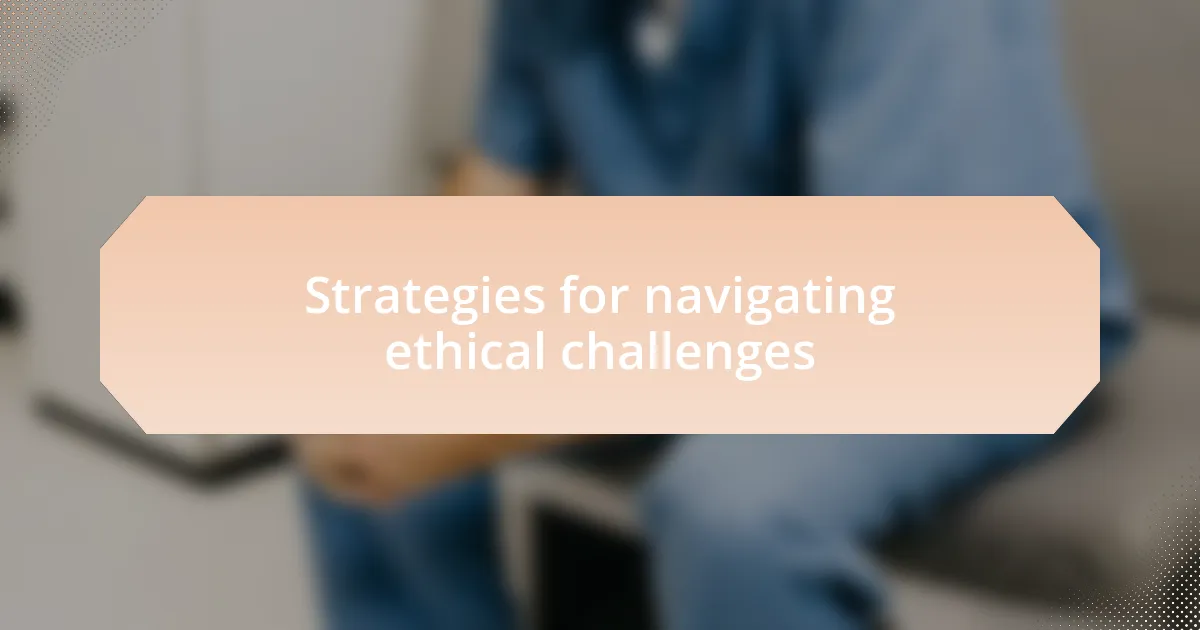
Strategies for navigating ethical challenges
One effective strategy I’ve found is to practice active listening. I remember a situation where a patient expressed frustration about their treatment plan. Instead of immediately offering solutions, I took a step back and really listened to their concerns. This not only helped me understand their perspective better but also built trust, creating an environment where we could explore ethical challenges together.
Another crucial tactic is to involve a multidisciplinary team in discussions. In one memorable case, I worked with social workers and ethicists to navigate a complex decision involving a patient’s end-of-life care. The diverse viewpoints enriched our understanding and led to a more holistic approach that respected the patient’s wishes while addressing ethical obligations. Have you ever considered how collaboration can unveil new insights in difficult situations?
Finally, I rely heavily on reflective practice. After navigating a particularly challenging ethical choice, I take time to reflect on what I learned, both emotionally and professionally. For example, after a tough conversation with a patient’s family, I journaled about my feelings and the decisions made. This approach not only helps me process my emotions but also enhances my preparation for future dilemmas—are we not all continually learning and growing in this journey?
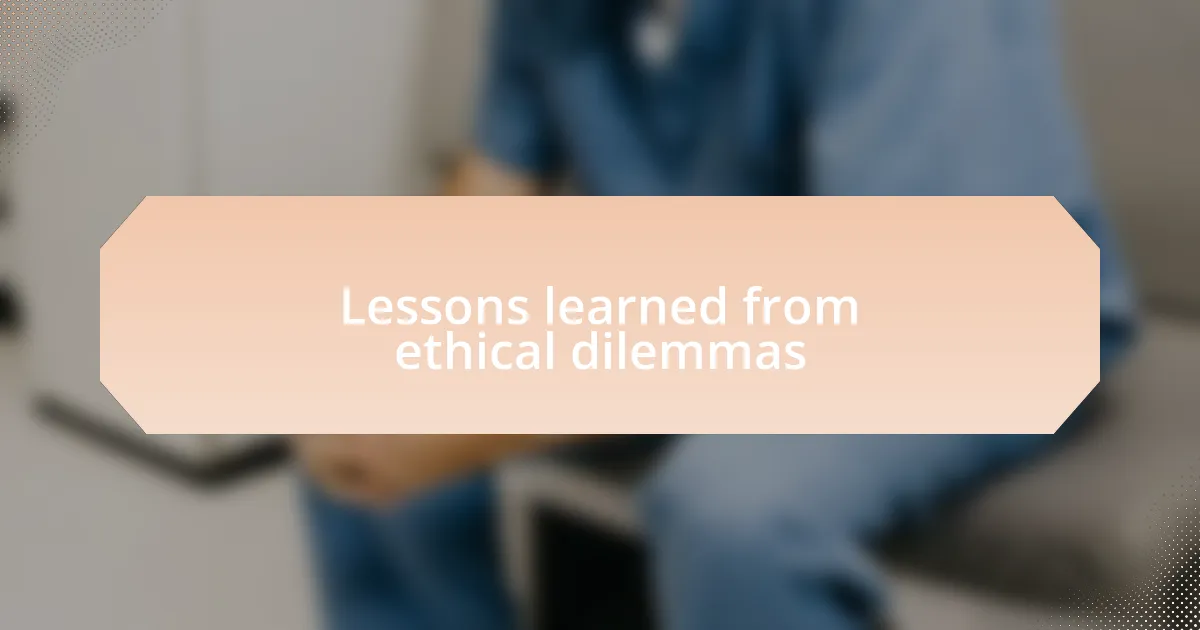
Lessons learned from ethical dilemmas
Experiencing ethical dilemmas has taught me the importance of adaptability. I recall a time when the treatment options for a patient suddenly changed due to unforeseen complications. Initially, I felt a wave of anxiety; however, I realized that staying flexible allowed me to pivot quickly and consider alternative solutions that aligned with the patient’s goals. Have you ever noticed how quickly circumstances can shift, prompting us to rethink our approach?
Another significant lesson is the value of transparency. During one particularly challenging situation, I had to deliver unwanted news to a patient. I remember that being open about their condition, even when it was tough, fostered a connection, allowing us to jointly explore what the next steps should be. This experience reinforced my belief—how often do we underestimate the power of honesty in building trust?
Lastly, resilience emerges from facing tough decisions. I once found myself in a high-pressure scenario where each choice felt fraught with ethical implications. Reflecting on that experience, I understood that even when weighed down by the heaviness of these moments, they ultimately propelled my growth. Can we agree that our most profound lessons often come from our most challenging experiences?